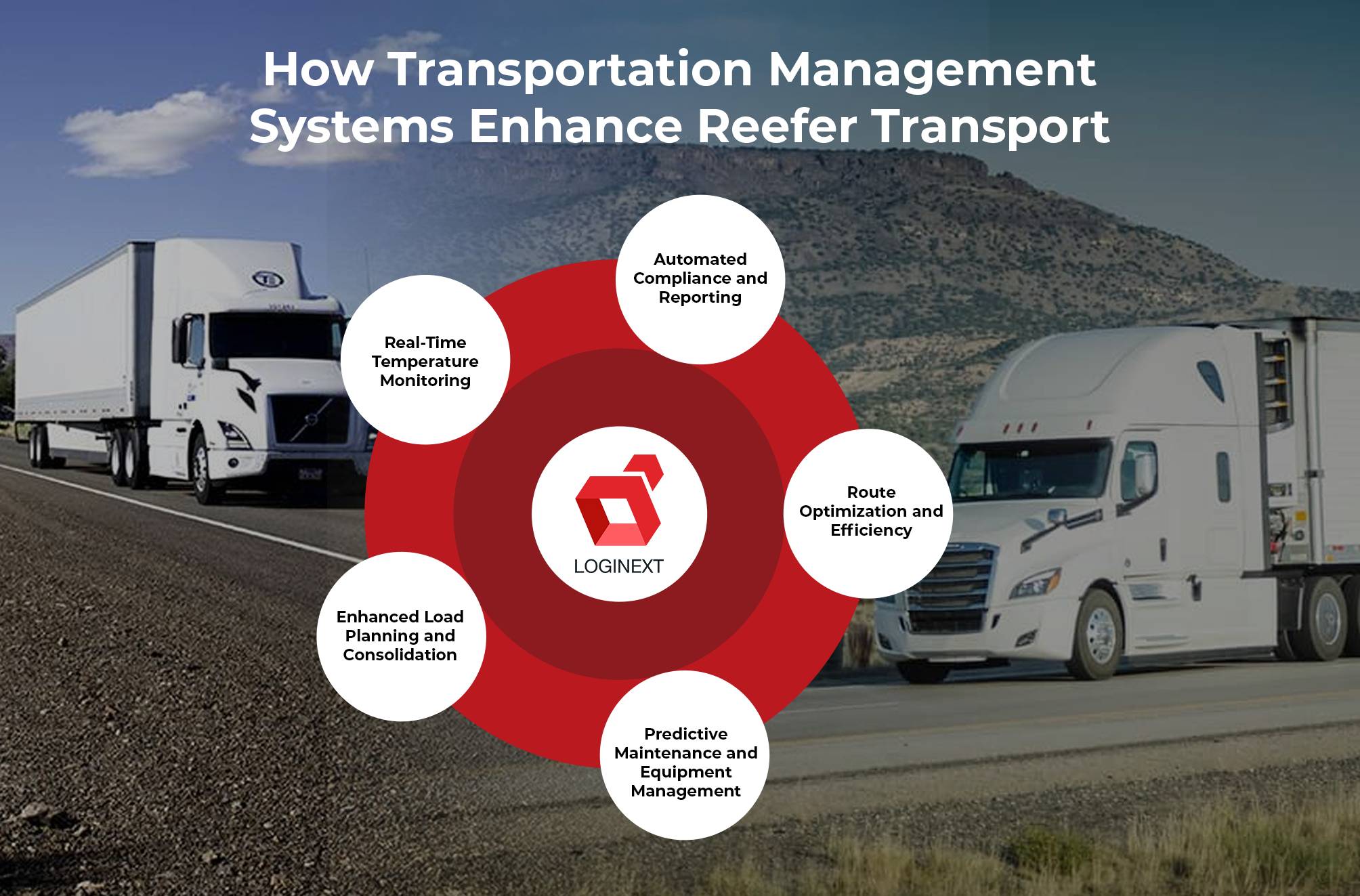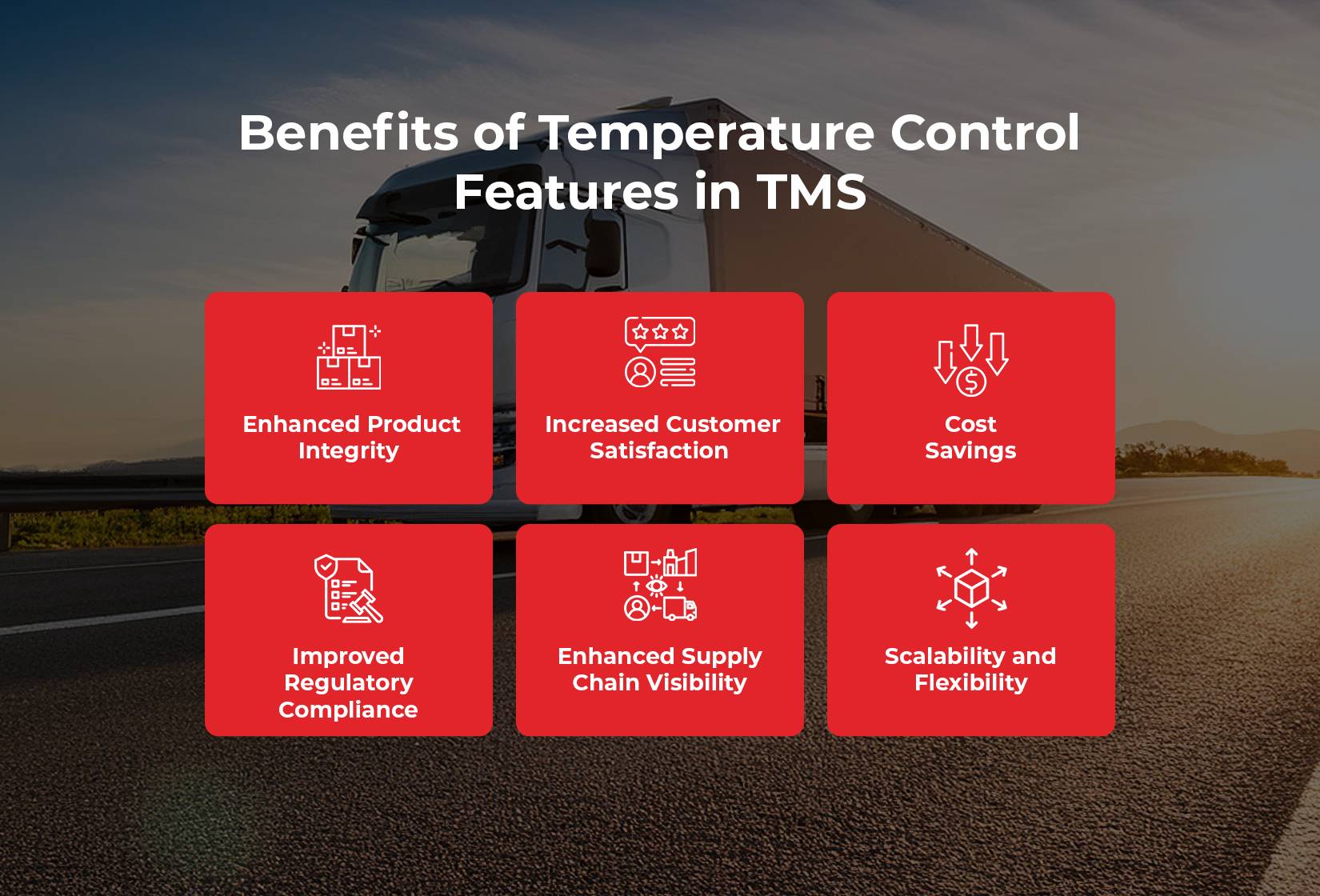
Optimizing Reefer Transport with Temperature Control Features in TMS
Transportation management systems (TMS) have revolutionized the logistics industry by enhancing efficiency and reducing costs. In the realm of reefer transport, TMS plays a pivotal role by ensuring temperature control, which is critical for transporting perishable goods. This technological advancement not only helps maintain the quality and safety of products but also streamlines compliance with regulatory standards.
By integrating real-time monitoring and advanced analytics, TMS provides a robust solution for managing the complexities of temperature-sensitive shipments. This blog explores how TMS optimizes reefer transport, focusing on temperature control features, and highlights its significance for various industries, including food and beverages and pharmaceuticals.
Quick Read: Enhance Raw Material Transportation Using TMS Solution
Importance of Temperature Control in Reefer Transport
Reefer transport, or refrigerated transportation, is essential for industries like food and beverages and pharmaceuticals, where maintaining specific temperature ranges is crucial. Any deviation can lead to spoilage or compromised product integrity, resulting in financial losses and reputational damage.
How Transportation Management Systems Enhance Reefer Transport

1. Real-Time Temperature Monitoring:
One of the standout features of modern Transportation Management Systems is real-time temperature monitoring. Sensors placed within the reefer units provide continuous data, allowing logistics managers to track and maintain optimal temperatures throughout the journey. For instance, LogiNext’s cloud-based TMS can send alerts if the temperature deviates from the preset range, enabling immediate corrective actions. This feature is invaluable for TMS for food and beverage transportation, where even slight temperature variations can spoil entire shipments.
2. Automated Compliance and Reporting:
Compliance with regulatory standards is non-negotiable in reefer transport. LogiNext’s TMS facilitates automated compliance by maintaining accurate records of temperature logs, ensuring that all shipments meet the necessary standards. This automation not only saves time but also reduces the risk of human error. Thus making our enterprise transportation management system indispensable for businesses handling sensitive goods.
3. Route Optimization and Efficiency:
Optimizing routes is another critical function of TMS. Efficient route planning reduces transit times and fuel consumption, directly impacting transportation costs. A well-implemented TMS can incorporate temperature control needs into route planning, ensuring that perishable goods reach their destination promptly. This is particularly crucial for TMS for pharmaceutical delivery, where delays can lead to significant losses.
4. Predictive Maintenance and Equipment Management:
LogiNext’s TMS supports predictive maintenance by monitoring the health and performance of reefer units. By analyzing data from sensors and historical maintenance records, we can predict when a reefer unit is likely to fail or require servicing. This proactive approach minimizes the risk of equipment breakdowns during transit, ensuring that temperature-sensitive goods remain protected. This capability of our cloud-based TMS solution can help businesses leverage vast amounts of data for accurate predictions.
5. Enhanced Load Planning and Consolidation:
TMS enhances load planning and consolidation by efficiently managing space within reefer units. Advanced algorithms consider the temperature requirements of different goods, allowing for optimal load distribution and consolidation. This not only maximizes the use of available space but also ensures that temperature-sensitive products are placed in the most suitable areas within the reefer. Effective load planning helps reduce the number of trips needed, contributing to lower fuel consumption and overall transportation costs. This aspect of LogiNext’s TMS is crucial for enterprises looking to optimize their logistics operations and reduce expenses.
Did you know? 10 Critical Capabilities of Modern Transportation Management System
Case Study: Best Transportation Management Systems for Food and Beverage Transportation
Consider a scenario where a food distribution company uses LogiNext’s TMS to manage its fleet of refrigerated trucks. Our TMS integrates real-time temperature monitoring with route optimization, ensuring that the perishable items are transported under optimal conditions. As a result, the company experiences a 20% reduction in spoilage rates and a 15% increase in delivery efficiency. These improvements highlight how to reduce transportation costs with our TMS while maintaining high standards of product quality.
Benefits of Temperature Control Features in Transportation Management Systems

1. Enhanced Product Integrity:
Maintaining the integrity of temperature-sensitive products is paramount. With advanced TMS features, businesses can ensure that their products remain within the required temperature ranges, preserving their quality and safety. This benefit is critical for TMS for pharmaceutical delivery, where even minor temperature fluctuations can render medicines ineffective.
2. Increased Customer Satisfaction:
Customers expect timely deliveries of fresh and safe products. By leveraging TMS, companies can meet these expectations, leading to increased customer satisfaction and loyalty. A cloud-based TMS allows for seamless communication and transparency, enabling customers to track their shipments in real-time.
3. Cost Savings:
Implementing a robust cloud-based TMS leads to significant cost savings. By optimizing routes and ensuring efficient fuel usage, businesses can reduce their operational costs. Additionally, minimizing product spoilage and waste contributes to overall cost reduction. This aspect of how to reduce transportation costs with a TMS is especially beneficial for enterprises with large-scale operations.
4. Improved Regulatory Compliance:
Temperature-controlled transportation often involves stringent regulatory requirements. Advanced TMS solutions like LogiNext automate the documentation process, ensuring accurate and timely reporting. This feature helps businesses stay compliant with industry standards and regulations, avoiding potential fines and penalties. For industries like pharmaceuticals, where compliance is critical, our TMS for pharmaceutical delivery can significantly streamline operations and ensure adherence to regulatory mandates.
5. Enhanced Supply Chain Visibility:
A TMS provides end-to-end visibility into the supply chain, allowing businesses to monitor shipments in real-time. This transparency is crucial for managing temperature-sensitive goods, as it enables proactive issue resolution and better decision-making. Enhanced visibility also facilitates collaboration among stakeholders, ensuring that everyone is informed and aligned. Enterprise transportation management systems with robust visibility features can help businesses maintain control over their supply chain operations, reducing risks and improving efficiency.
6. Scalability and Flexibility:
As businesses grow, their logistics needs become more complex. A TMS offers scalability and flexibility, allowing companies to adapt to changing demands. Whether it’s expanding the fleet, integrating new technologies, or entering new markets, a cloud-based TMS can scale with the business. This flexibility ensures that temperature control and other critical features continue to support the company’s operations, regardless of scale. For enterprises looking to maintain agility and responsiveness, investing in a scalable TMS solution like LogiNext is essential.
Check Out: Everything You Need To Know About Transportation Management Software
Future Trends in Transportation Management Systems for Reefer Transport
As technology advances, TMS solutions are becoming more sophisticated. The future of reefer transport lies in integrating advanced analytics, artificial intelligence, and machine learning into TMS. These technologies can predict potential issues before they occur, allowing for proactive measures. For instance, AI-driven TMS like LogiNext can analyze historical data to predict temperature fluctuations and suggest optimal routes and times for transportation. This advancement will further enhance the efficiency and reliability of TMS for pharmaceutical delivery and other sensitive cargo.
Best Transportation Management Systems For Reefer Fleet Management
Transportation Management Systems are indispensable for optimizing reefer transport, particularly through their temperature control features. By ensuring real-time monitoring, compliance, and route optimization, TMS significantly enhances the efficiency and reliability of transporting perishable goods. Whether it’s TMS for food and beverage transportation or TMS for pharmaceutical delivery, the benefits are clear. Implementing a robust, cloud-based TMS like LogiNext can lead to substantial cost savings and improved customer satisfaction. Thus making it a critical investment for businesses aiming to excel in the logistics industry. Click on the red button below to book a demo today!
138







@LogiNext